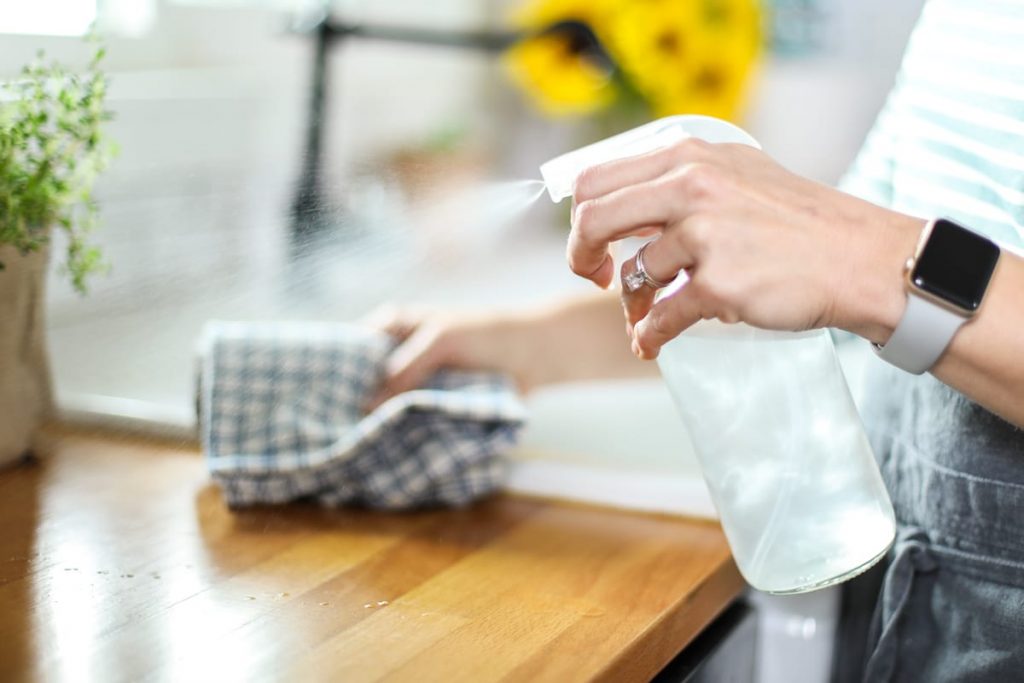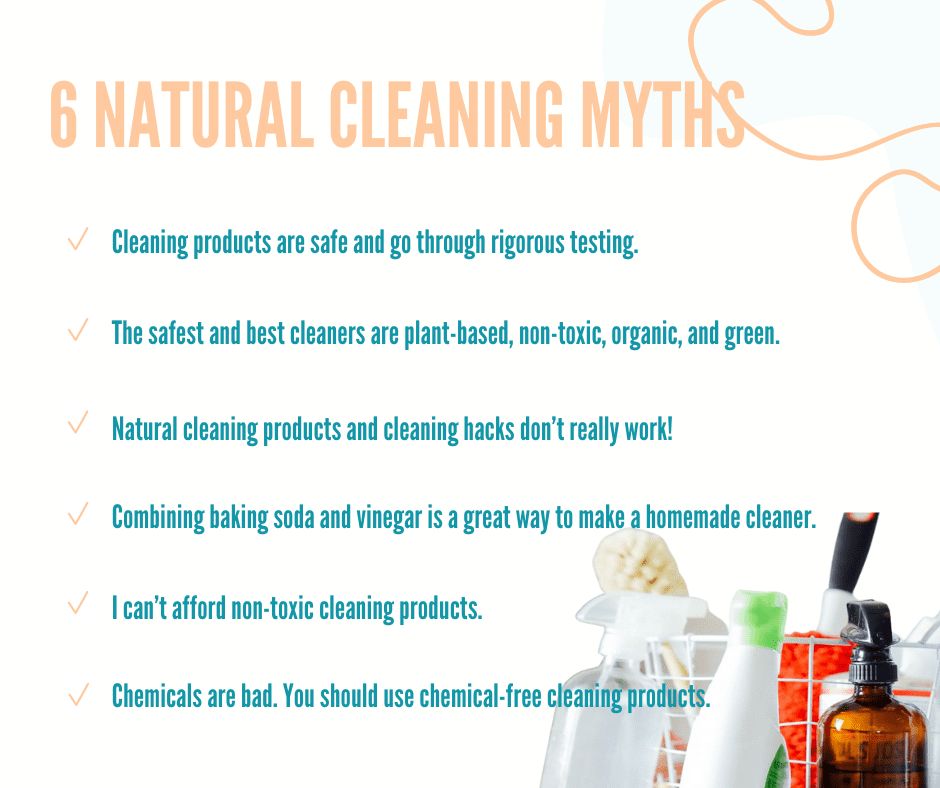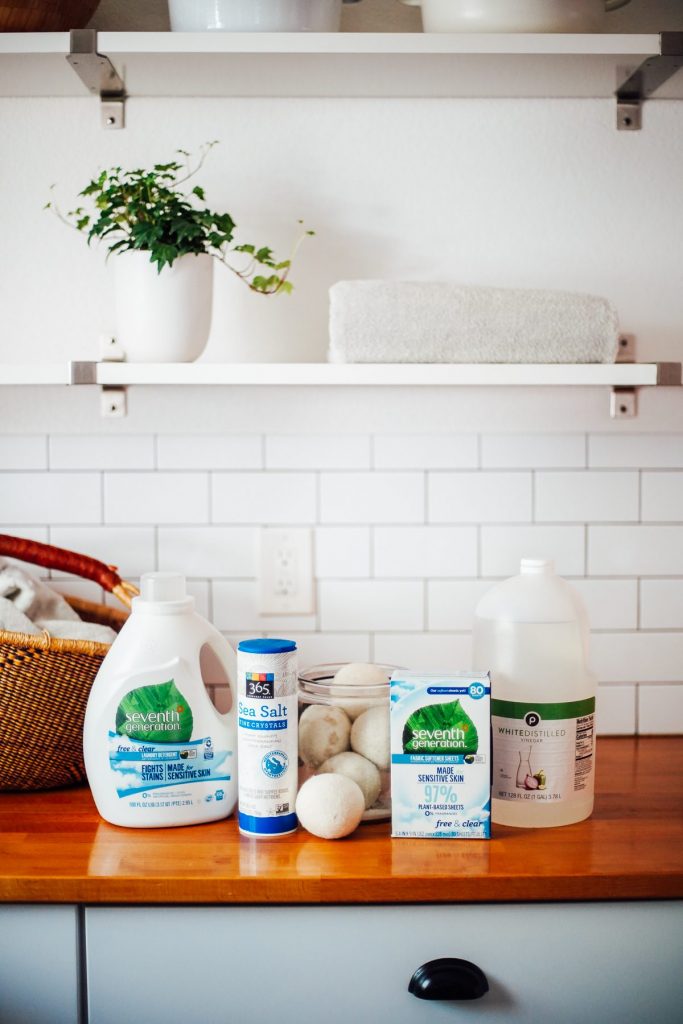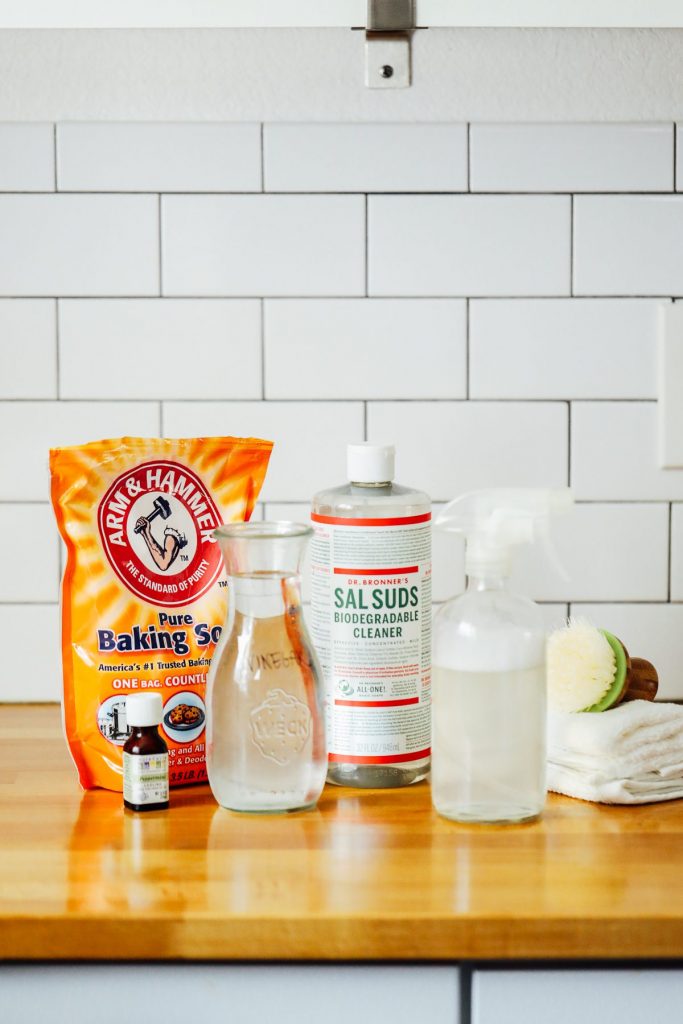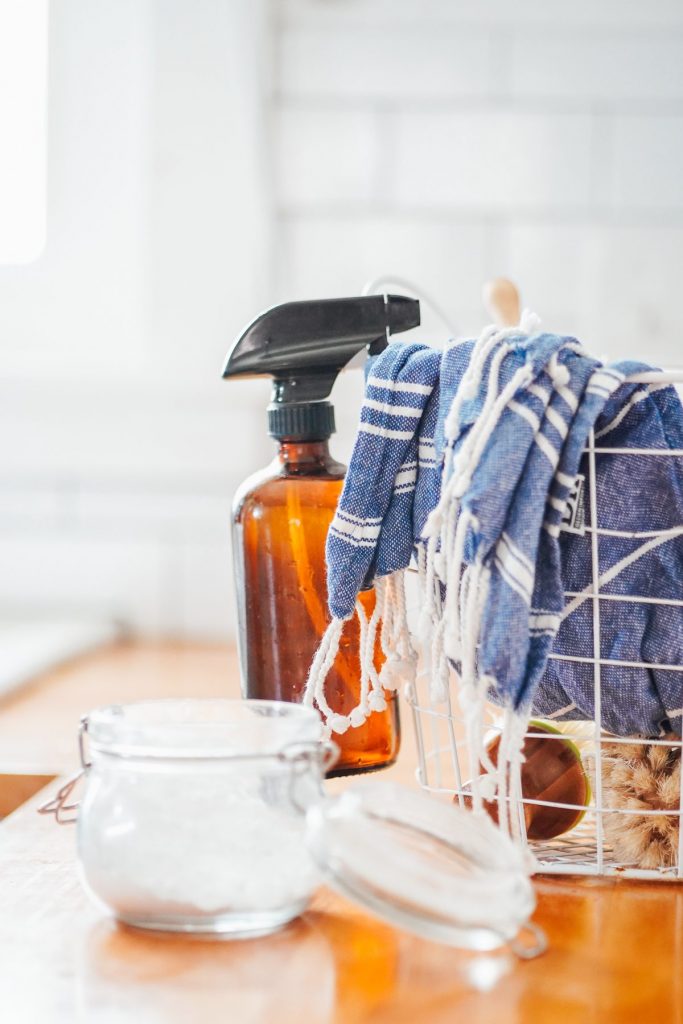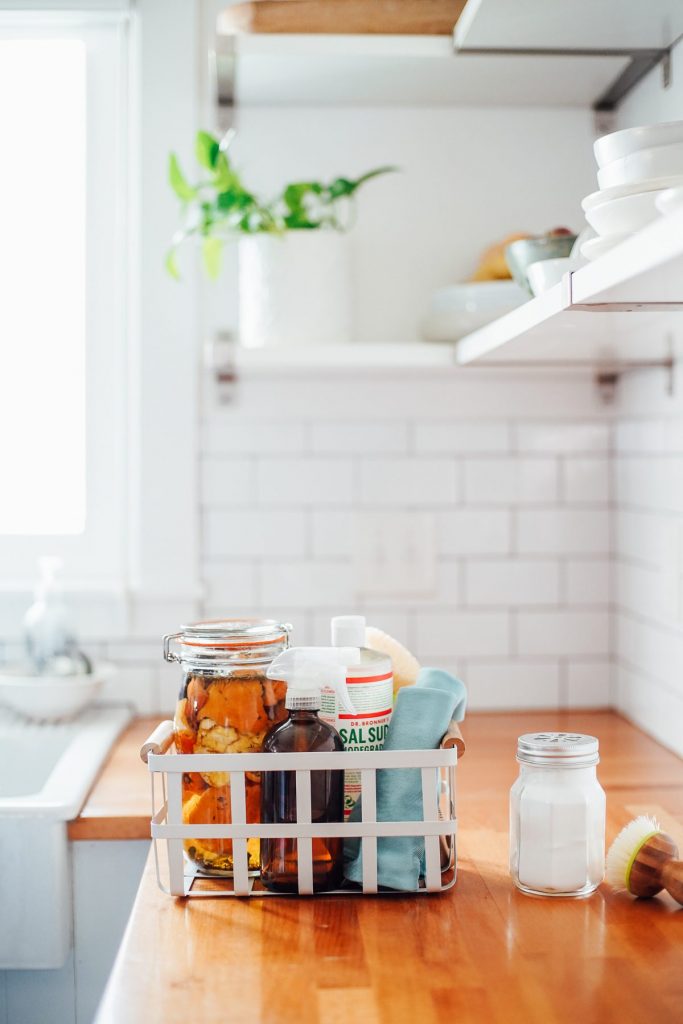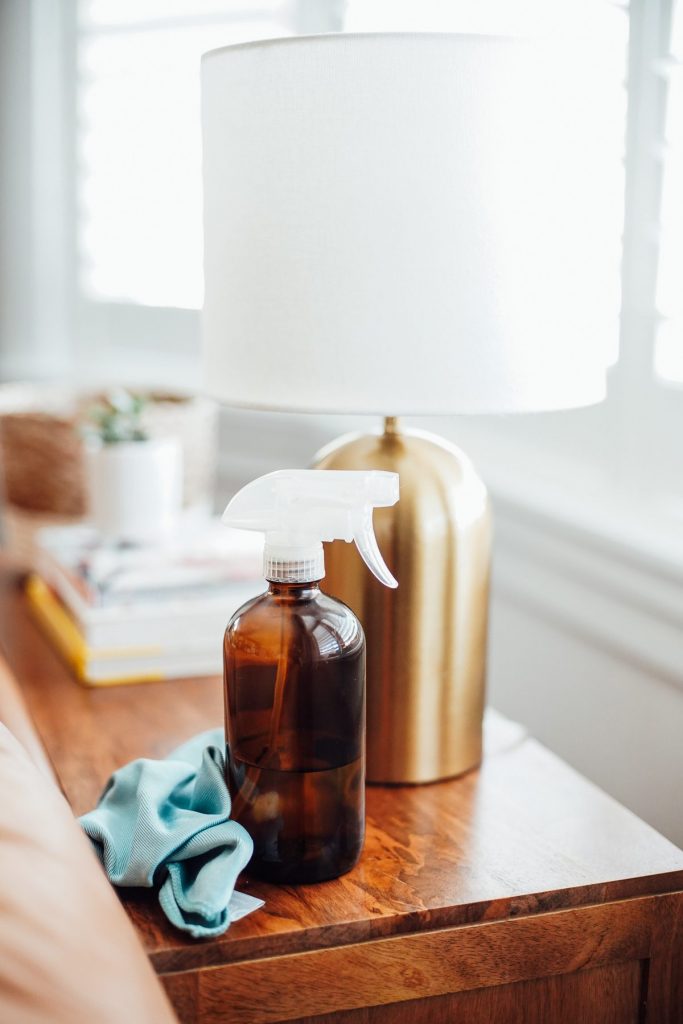Although terms like “green” and “all-natural” are becoming more mainstream, misconceptions about natural cleaning products and methods are still all over the place. Here’s the real scoop on 6 common natural cleaning myths.
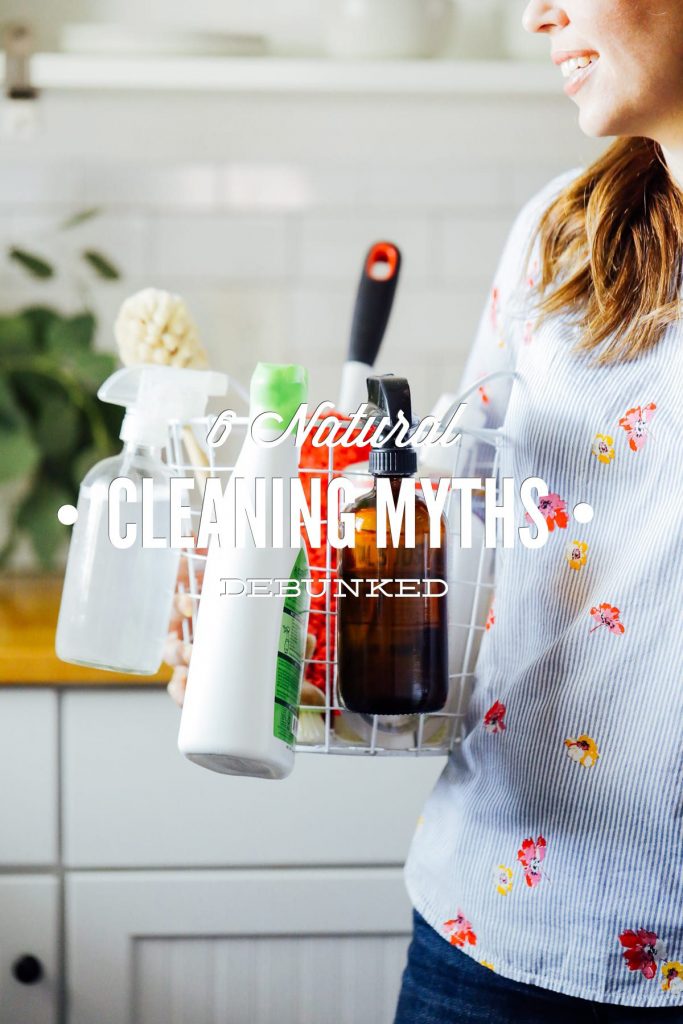
Want to Save This Article?
Enter your email & I’ll send it straight to your inbox. And you’ll get new recipes & tips each week.
Environmental experts predict that the average household uses over 62 toxic chemicals to clean their home…
And the ingredients used to make cleaning products have raised concerns over the years with links to gut issues, hormone imbalances, cancer, and other health impacts. Making the switch to natural cleaning products will improve the air quality in your home, reduce your exposure toxic ingredients, and create a healthier home environment for you and your family.
Using natural cleaning products isn’t difficult, but making the switch can incredibly confusing. There’s so much noise out there and all this noise can lead to a lot of confusion, deceptive marketing, not-so-great DIY recipes, and myths. We’re going to clear things up today and debunk 6 natural cleaning myths that keep people from making the switch to natural cleaning. Clearing up these myths will help you confidently begin making the switch to natural cleaning products and methods.
6 Natural Cleaning Myths, Debunked
Myth 1: Cleaning products are safe and go through rigorous testing.
Debunked: The U.S. Government doesn’t test cleaning products and doesn’t mandate that companies test them either. As a consumer, you’re asked to simply trust that products are safe and companies have your best interest at heart, but should you? Some of the chemicals used to make cleaning products raise serious concern (like phthalates and phenols), but this doesn’t keep companies from using these ingredients. You must be your own advocate and be aware of what to look for and what to avoid. Awareness is 90% of the game!
You want safe cleaning products that are effective and made with ingredients that won’t potentially cause harm to your health (i.e. disrupt hormones, contribute to allergies and migraines, etc.). You must be an ingredient list detective, looking past marketing hype and trendy buzzwords that are used to lure consumers.
Myth 2: The safest and best cleaners are plant-based, non-toxic, organic, and green.
Debunked: Did you know that the cleaning industry is a 221 billion dollar industry? Cleaning companies know that you want safer, healthier, more natural products, so what do they do? Marketers use buzz words like plant-based, green, non-toxic, natural, and organic to market products and lure you in. Companies know that these words sell! But these trendy labels are unregulated. A company can throw out these terms as a way to earn your trust and business. Cleaning companies also use language like “no phthalates” to show you how much they care about your health and why you should trust their product. While this can be helpful, you shouldn’t use this info alone to make an informed decision about whether a cleaning product is natural and non-toxic.
Myth 3: Natural cleaning products and cleaning hacks don’t really work!
Debunked: There are many DIY recipes on Pinterest and non-toxic cleaning products sold by companies that don’t work and turn people away from natural cleaning. This is a shame, because natural cleaning products, hacks, and methods can be incredibly effective! Michelle, a reader friend who has been making Live Simply cleaner recipes, recently shared, “I can’t believe how effective these homemade cleaners are! They work better than the cleaners I was purchasing.” You don’t have to compromise your standard of clean just to use safer cleaning products. You only need a few essential ingredients and products to clean your entire home. A great place to start is by making a homemade all-purpose cleaner.
One key to making natural cleaning products is to know which products can and cannot be combined and which ingredients are best to use in your home. The same goes for commercial cleaners, too. You can’t use a floor cleaner on your kitchen counters and expect it to perform. Think of natural cleaning the same way! Yes, many non-toxic ingredients are multi-purpose (can be used to make multiple cleaning solutions), but it’s important to be informed about how and where to use the ingredients and products. This can require a lot of research and experimentation, or you can use tested cleaning recipes or buy from trusted cleaning brands that consistently perform (one of my favorites is Branch Basics, code livesimply takes 10% off)
Myth 4: Combining baking soda and vinegar is a great way to make a homemade cleaner.
Debunked: This combo is common in recipes online and even some cleaning books. When combined, vinegar (an acid) and baking soda (a base) fizz (the reaction) and cancel each other out, which is an awesome science experiment for the kiddos. This fizz is caused by a chemical reaction, resulting in basically salty water which neutralizes the cleaning power of both ingredients. Now, salt is used in some of my favorite cleaning recipes, so I’m not saying salt is bad. If you want salt water come visit my family in Florida, just don’t mix vinegar and baking soda with the hope of making an awesome cleaner. Note: People swear by this combination when it comes to a clogged drain and will pour it down a sink to remove the clog. This success can be associated with the reaction of the two ingredients.
This is the perfect example of why people view natural cleaning mixtures as ineffective. Baking soda and vinegar are fantastic cleaning ingredients and should be part of your natural cleaning caddy, but they don’t make a great cleaning experience when combined. Two more natural cleaning ingredient combos to avoid.
Myth 5: I can’t afford non-toxic cleaning products.
Debunked: Yes, natural and non-toxic cleaning products can cost more than conventional cleaning products. Many times, these products are made by small businesses and use ingredients that cost more to produce. I’ve found the best solution is to learn how to make easy and essential cleaning products with simple (and cheap) ingredients like white vinegar, castile soap, and baking soda. With these ingredients you can make: all-purpose cleaner, bathroom cleaner, stain remover, streak-free glass cleaner, oven cleaner, dish soap, and hard floor cleaner. These cleaners take less than 2 minutes to combine in a glass spray bottle, soap dispenser, or mop bucket, and each product costs just pennies to make!
Some natural cleaning products don’t require any mixing. For example, baking soda is a fantastic natural cleaner that costs just one dollar per box and can be used as a scrub cleaner to clean tubs and sinks or shake in toilet bowls for an inexpensive toilet bowl cleaner.
I recommend buying natural cleaning products for things that require more time and patience to DIY or products that you don’t use very often. For me, I choose to buy dishwasher detergent and laundry detergent.
Myth 6: A clean home should smell clean.
Debunked: This is the biggest struggle for people when making the switch to natural cleaning: the lack of scent. We have been told, through marketing messages from companies who want to sell us their products, that a clean home or fresh laundry smells a certain way. The truth is, clean isn’t a scent.
Fragrance is added to cleaning products to trigger a good feeling and convince you that your home is clean, based on a scent alone, which creates a lifelong (addicted) customer. It’s smart marketing! But there’s a dirty secret about that fragrance…
Fragrances are made with multiple lab-generated chemicals that are blended together to create a particular scent. (Chemicals aren’t bad–another natural cleaning myth, but we need to make sure that the chemicals used are safe which is why all ingredients should be disclosed. This is not usually the case with fragrance.) Lots of different chemicals may be hiding under this vague ingredient name. Since this word is a “trade secret” companies are not required to disclose the exact chemicals or formulations used to make a particular fragrance.
You can add a lovely scent to natural cleaning products by using essential oils and buy from companies who fully disclose their fragrance ingredients. But just because a product smells a certain way doesn’t mean it’s an effective cleaning product.
Bonus Myth 7: Chemicals are bad. You should use chemical-free cleaning products.
Debunked: Okay I mentioned 6 natural cleaning myths, but I have to mention this myth before you go. This is a very common myth that I see all over Pinterest and Instagram. Chemicals are NOT bad. Everything has a chemical composition: water, baking soda, vinegar. Everything!
The goal isn’t to go chemical-free with your cleaning routine, as that would be impossible. The goal is to use chemicals that are proven to be safe and to stay away from chemicals that have a negative impact on our health and environment. There are plenty of chemicals that are currently used in commercial products that are of known concern: disrupt hormones, have been linked to cancer, have a negative impact on gut microbiome, and trigger asthma and allergies. The goal isn’t to go chemical free; rather, it’s to use proven-to-be safe ingredients and products that clean your home and promote health.

